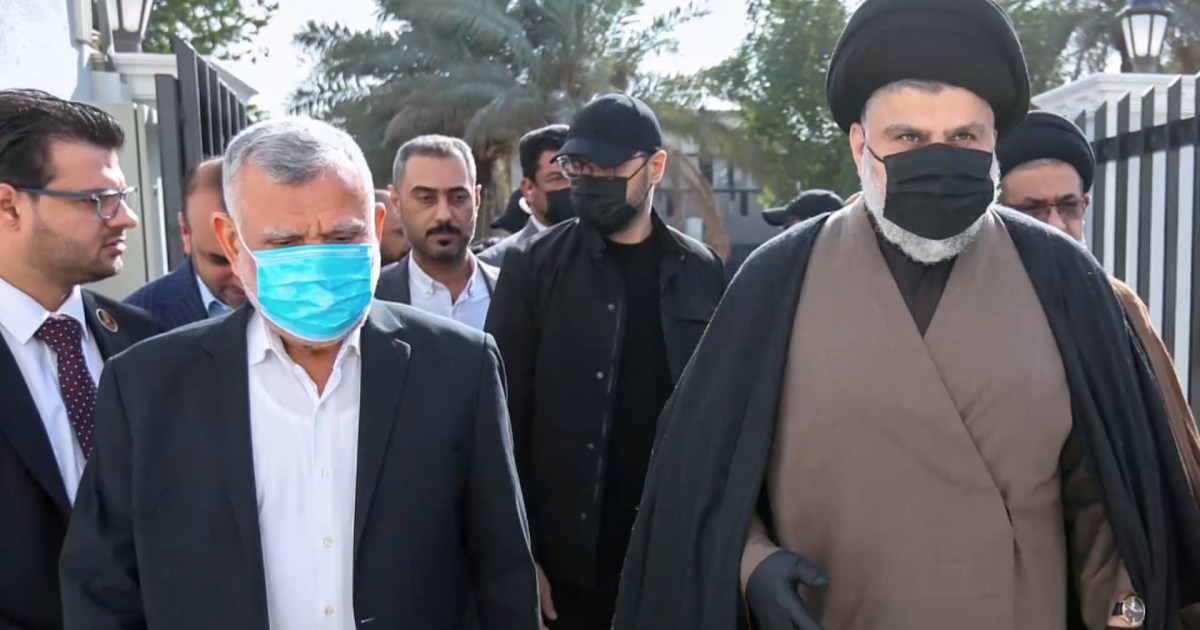The coordination framework in Iraq, consisting of Shiite political forces opposing the results of the parliamentary elections, decided to intensify its discussions with other political forces to contain the political crisis in the country.
The framework includes the State of Law coalition, the State Forces Alliance, the Victory Alliance, the Al-Fateh Alliance (the Popular Mobilization Factions, some of which are close to Iran), the Ataa Movement, and the Virtue Party.
A statement issued by him said that the leaders of the framework discussed in the meeting (in the capital, Baghdad, on Sunday) the results of a meeting that brought together one of its leaders, Hadi al-Amiri, head of the Al-Fateh Alliance, with the leader of the Sadrist movement, Muqtada al-Sadr, the day before yesterday, Saturday.
Al-Amiri and Al-Sadr met on Saturday evening in Najaf Governorate (south), without issuing a statement from either of them regarding the outcome of the meeting.
The statement stressed the unity of the framework's orientations in achieving the interests of citizens, protecting national unity, and continuing dialogue with political forces to reach a solution that would bring the country out of the dangerous juncture it is going through.
He stated that the coordinating framework forces will intensify meetings and dialogues with other partner political forces in the country.
An atmosphere of tension prevails in Iraq after the parliamentary elections, amid the objection of the forces and factions within the coordination framework to the results on the grounds that they are fraudulent.
The Sadrist bloc topped the elections with 73 seats (out of 329 in parliament), followed by the Progress Alliance with 37, the State of Law coalition with 33, and then the Kurdistan Democratic Party with 31.
Al-Sadr seeks to form a majority government, unlike previous sessions that witnessed the formation of consensus governments among all the election winners, while the coordination framework calls for the formation of a unified Shiite front with the Sadrist bloc and the formation of a consensus government.
Two explosions in Karrada neighborhood
The Security Media Cell in the Iraqi Joint Operations Command said yesterday evening, Sunday, that two people were wounded by the explosion of two explosive devices in two separate places in the Karrada neighborhood of Baghdad.
Security forces are opening an investigation into two simultaneous incidents in the Karrada area of Baghdad that occurred this evening, the first of which was the explosion of a sound bomb on Cihan Bank near the National Theater…
— Security Media Cell 🇮🇶 (@SecMedCell) January 16, 2022
A statement by the Security Media Cell stated that the security forces opened an investigation into two simultaneous incidents in the Karrada area of Baghdad that occurred yesterday evening, Sunday, the first of which was the explosion of a sound device on the Cihan Bank near the National Theatre, and the second was the explosion of a sound device that also targeted the Kurdistan Bank near Al-Wathiq Square. The two accidents left two civilians slightly injured.
Ambulances and civil defense vehicles arrived at the scene of the explosions, while security forces deployed on the roads leading to the two explosions.
On Sunday evening, Iraqi President Barham Salih described the bombings in Baghdad as terrorist acts that threaten civil peace.
"The recent bombings in Baghdad are condemned criminal terrorist acts that threaten the security and stability of citizens," Saleh said in a tweet on his personal account on the social networking site Twitter.
He added that these bombings "come at a suspicious time targeting civil peace and constitutional merit by forming a capable government that will protect the Iraqis and guarantor of the independent national decision."
Commander of the Quds Force in Najaf
On the other hand, the commander of the Quds Force in the Iranian Revolutionary Guard, Ismail Qaani, arrived in the city of Najaf (south of the Iraqi capital Baghdad).
Pictures of his visit showed the tombs of Qassem Soleimani, the former commander of the Quds Force, and Abu Mahdi al-Muhandis, the former deputy head of the Popular Mobilization Authority in Iraq, who were killed in a US raid in Baghdad in January 2020.

